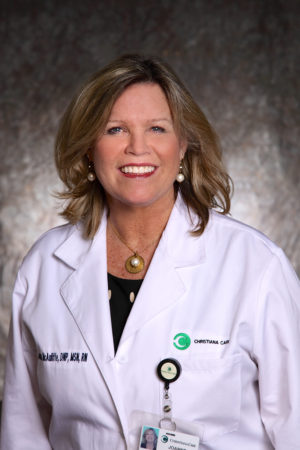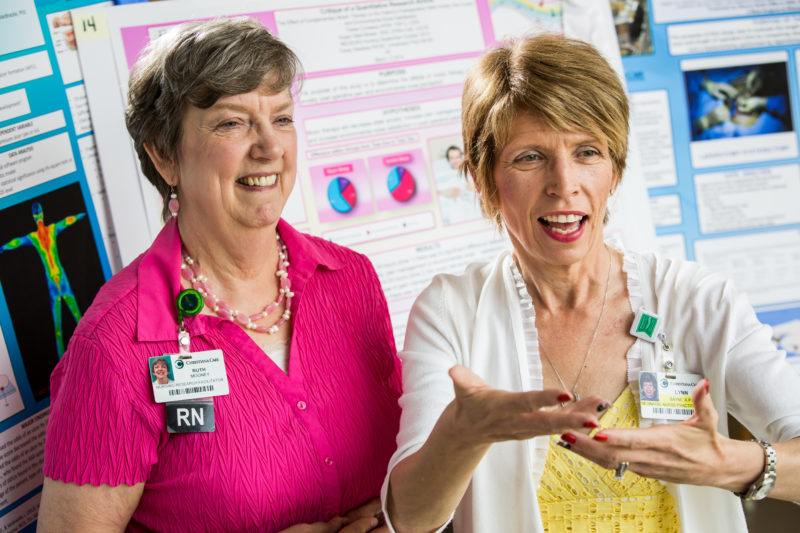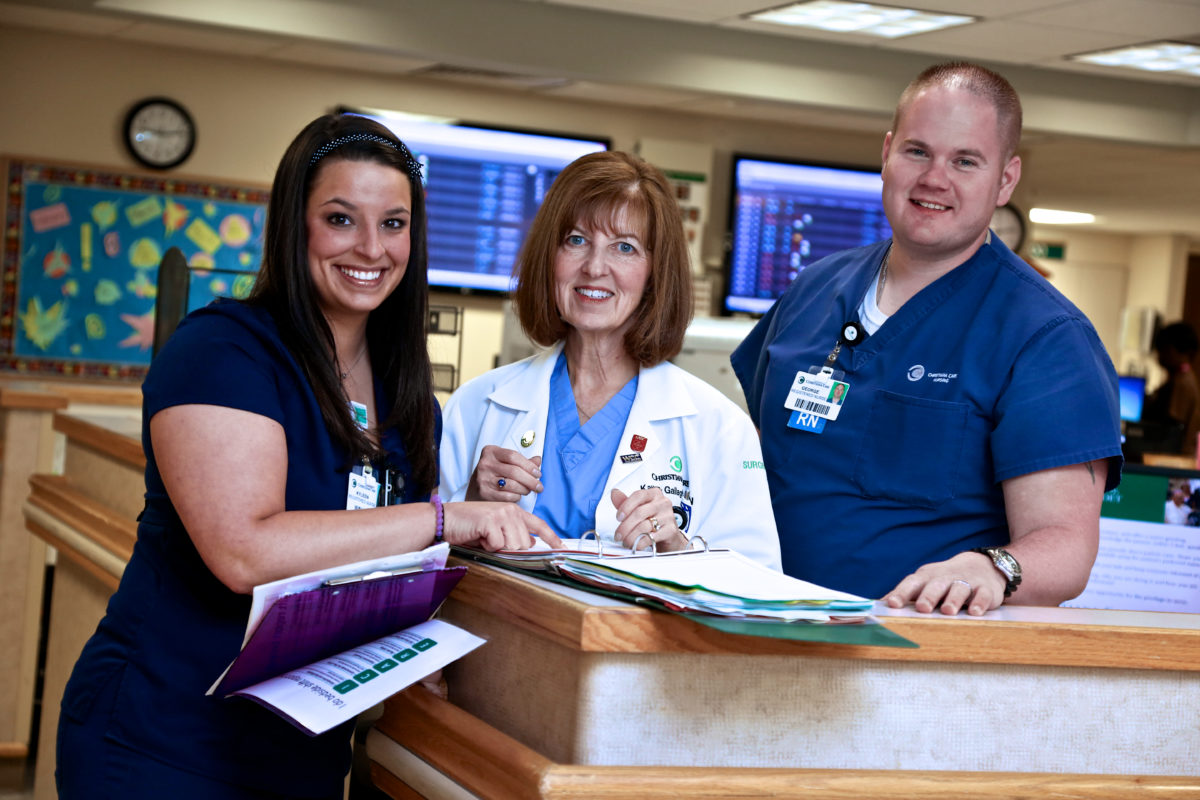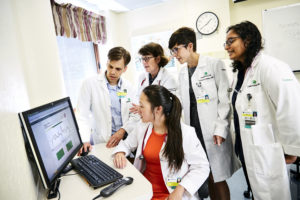Outstanding nursing care is at the heart of a hospital’s excellence. At Christiana Care Health System, patients are benefiting from a growing number of nurses who have attained advanced training and expertise by earning the highest degrees in nursing — a Ph.D. or a doctoral degree in nursing practice (DNP).

“So much of what happens in a hospital is a direct result of nursing care and nursing practice decisions,” said Vice President for Patient Care Services Joanne McAuliffe, DNP, MSN/BA, BSN, RN, OCN, NEA-BC. “Doctoral programs prepare nurses to think strategically and help their organizations improve care delivery.”
McAuliffe, who earned her Doctor of Nursing Practice at Johns Hopkins University School of Nursing, stressed that doctoral-level nursing programs are important to the future of health care. “These programs prepare nurses to look at patient populations beyond the acute care setting, and to forecast and prepare for what’s coming in the future,” she said. “It is clear that health care, in settings across the trajectory of care, needs more doctorally prepared nurses at the nurse-leader level to translate evidence into practice, improve patient outcomes and transform care delivery.”
Patients, their communities and the health care field all benefit from doctorally prepared nurses, said Michelle L. Collins, MSN, APRN, CNS, RN-BC, ACNS-BC, LSSBB, director of the Magnet program at Christiana Care.
“Not only does the doctoral degree inform nursing practice and research,” said Collins, who is pursuing her Doctor of Nursing Practice at Wilmington University. “These degrees open the door for nurses to inform national policy as well.”
Two degree options
In the United States, nurses can pursue either of two doctoral-level nursing degrees: a Doctor of Philosophy in nursing (Ph.D.) or a Doctor of Nursing Practice (DNP). The Ph.D. in nursing is a research-focused doctorate with an emphasis on preparing nurses to advance the science of nursing. The DNP is a practice-focused doctorate that prepares nurses to apply another level of advanced care, apply the latest research in clinical settings, and provide leadership in patient care and nurse training.
Christiana Care has long been a leader in supporting nursing excellence, which includes providing both pre-paid and tuition-reimbursement programs for nurses furthering their educations. The health system’s distinction in supporting nursing education, including its pre-pay option for doctoral programs, was recognized by the American Nurses Credentialing Center when it awarded Christiana Care Magnet designation in 2010 and redesignation in 2015. Magnet status is the country’s highest recognition for nursing excellence and is held by only 7 percent of the nation’s hospitals.

Answering the call for nursing doctorates
In 2004 the American Association of Colleges of Nursing (AACN) voted to raise, by 2015, the level of preparation needed for advanced nursing practice from the master’s degree to the doctorate. This decision followed a study in the Journal of the American Medical Association that identified a clear link between higher levels of nursing education and better patient outcomes. In 2005 the National Academy of Sciences also called for nursing to develop a doctorate that would prepare more nurses to serve as clinical faculty, as an aging population is increasing the demand for nurses nationwide.
In 2010 the Institute of Medicine released the landmark report “The Future of Nursing: Leading Change, Advancing Health” that, among its recommendations for bolstering nurse leadership, called for significantly increasing the number of nurses with doctorates. Nurses have responded to the call. According to the AACN, from 2013 to 2014 the number of students enrolled in DNP programs increased from 14,688 to 18,352, and the number of DNP graduates increased from 2,443 to 3,065.
Pursuing a personal nursing journey
Going back to school for a doctoral degree is a rewarding challenge, according to Staff Education Specialist Jennifer Painter, MSN, APRN, CNS, RN-BC, OCN, AOCNS.
“Obtaining this highest degree within nursing is going to help me think differently,” said Painter, whose job is to connect employees with educational opportunities. She is herself working toward a DNP at Wilmington University. “The degree is about gaining new perspective, new knowledge, new competencies, and learning to partner better with our patients and families. It is going to help me envision things differently, scope projects differently, and help me apply what I learn and continue to move our care to the next level.”
For Lorraine Nowakowski-Grier, MSN, APRN-BC, CDE, a diabetes nurse practitioner and diabetes educator who is also enrolled at Wilmington University, a DNP will help her “acquire the tools to better understand our health care system, its policies and finances, and become a better advocate for serving the diabetes population.”
Kathy Gallagher, DNP, APRN-FNP, CMC, UMC, BC, WCC, FACCWS, manager of the Acute Surgical Wound Service, found that her doctoral research has attracted international attention. A DNP graduate of Wilmington University, she presented her dissertation on the utility of web-based support for acute surgical wound care in London last year and in Atlanta in April, and she has been invited to present it in Florence, Italy, later this year. She has had two other research projects accepted for the Florence conference, one on catastrophic injuries and the other on the use of medical-grade honey as an alternative to surgery for open wounds.
“As more nurses recognize others are successfully earning their doctorates, they are inspired to pursue theirs,” said Gallagher. That sentiment is echoed by Jill Englund Jensen, DNP, APRN, FNP-BC, nurse practitioner in the Emergency Department Observation Unit.
“In a field like medicine, where there are so many changes and so many challenges, it’s important to continue to learn,” said Jensen. “To get more clinically savvy, yes — but also in terms of learning about systems and population health.”
Jensen completed her DNP in 2014 through the University of Alabama. Her capstone project involved studying factors that affect a patient’s length of stay. She is now a member of Christiana Care’s Advanced Practice Registered Nurse Council, which is helping to define the clinical ladder for advanced practice providers at the hospital.
“Being a ‘doctor nurse’ can be difficult for people to understand,” said Jensen. “But in time it will become better recognized.”
Nursing Research Facilitator Lynn Bayne, Ph.D., NNP-BC, noted that pursuing her doctoral degree was a natural extension of a lifelong quest for greater understanding.
“I consider myself a scientist,” said Bayne, who received her Ph.D. from the University of Delaware. “I love to learn, and I knew I wasn’t done learning yet.”
In her work, Bayne manages some 40 nursing research projects at any given time, some of which are capstone projects conducted by nurses pursuing doctoral degrees. Current examples, she noted, include research into expanding family visitation policies, improving wound-dressing options and developing patient registries to facilitate FDA-recommended retrievals of medical devices.
“The nursing Ph.D. supports conducting research and developing leadership theory,” Bayne explained. “The DNP helps to identify existing knowledge and best practices to bring to the bedside. These two doctoral degrees have a wonderful coexistence, side by side. Whether you are drawn to the Ph.D. track for research or to the DNP for applied science, it’s pretty exciting.”



